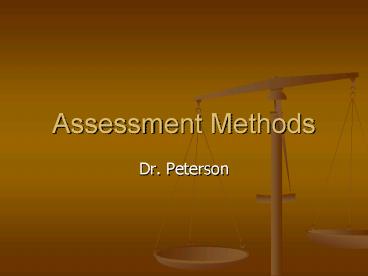Assessment Methods - PowerPoint PPT Presentation
1 / 27
Title:
Assessment Methods
Description:
Performance is examined on 'real' tasks with links to ' ... Diorama. Game. Etc. Assessment Options. Performance Assessment- could the learners perform a task? ... – PowerPoint PPT presentation
Number of Views:136
Avg rating:3.0/5.0
Title: Assessment Methods
1
Assessment Methods
- Dr. Peterson
2
Assessment
- Definition
- Estimate or judgment of the value of a person,
activity, or situation. - Functions
- Measuring, diagnosing, or instructing
- Types
- Criterion-Referenced Tests
- Norm-Referenced Tests
- Performance-based assessments
3
Assessment Methods
4
Performance
- Definition
- Performance is examined on real tasks with
links to real life applications. - Can you think of any examples?
5
Process
- Definition
- Problem-based learning based on process
objectives.
6
Product
- Definition
- The outcome of a procedure is a product evaluated
against a standard.
7
Portfolio
- Definition
- A purposeful integrated collection of student
work showing student effort, progress, or
achievement in one or more areas.
8
Assessment Options
- Process (Written) Assessments- could the learners
write to demonstrate their learning? - Report
- Poem
- Letter
- Posters
- Advertisements
- Etc.
9
Assessment Options
- Product/Project Assessment- could the learners
prepare a project? - 3-D model
- Invention
- Collage
- Diorama
- Game
- Etc.
10
Assessment Options
- Performance Assessment- could the learners
perform a task? The key to performance
assessments is that it is authentic promotes
transferability of learning to the real world. - Acting/role playing/drama
- Interview and presentation
- Demonstration
- Experiment
- Presentation
- Etc.
11
Making Assessment Meaningful
- To be meaningful, assessment has to have a
purpose that is significant. - Students are involved in setting learning goals
- Achieving the goals require the joint efforts of
several people - The goals are perceived to be relevant to the
students current lives. - Assessments are meaningful when all relevant
stakeholders clearly understand the procedures,
criteria, and rubrics being used. - Meaningful assessment provides a direction and a
road map for future efforts to learn. - Assessments should provide direction by
revealing - misunderstandings and gaps in learning that need
to be remediated - the next level of learning goals that need to be
achieved. - Assessments become more meaningful when the
results are used to point toward the next steps
in learning and instruction. - Meaningless assessment may provide achievement
scores with no implications for what the student
should do to correct and advance his or her
learning.
12
ASSESSMENT SHOULD DRIVE INSTRUCTION. THE
TEACHER MUST USE THE INFORMATION TO SET
INSTRUCTIONAL GOALS AND LEARNING GOALS SO THAT
PROGRESS CAN BE MADE THROUGHOUT THE YEAR.
13
Assessment Instruments
14
Rubrics
- A rubric is a set of categories which define and
describe the important components of the work
being completed, critiqued, or assessed.
(http//pblmm.k12.ca.us/PBLGuide/ThoughtPieces/Rub
ric.htm) - A scoring rubric is a set of ordered categories
to which a given piece of work can be compared.
Scoring rubrics specify the qualities or
processes that must be exhibited in order for a
performance to be assigned a particular
evaluative rating. (http//its.monmouth.edu/Facult
yResourceCenter/rubrics.htmDefinition)
15
Types of Rubrics
http//its.monmouth.edu/FacultyResourceCenter/rubr
ics.htmDefinition
16
Rubric Sample
Forestry Powerpoint Multimedia Project
Source http//rubistar.4teachers.org/inspiration/
forest.php
17
Presentation Rubric
18
Teamwork Rubric
19
Checklist Sample
20
Disposition
Checklist
21
Cooperative Group
Checklist
22
Assignment Sheet Sample
Checklist
Modified
23
Scoring Tool
Student __________________________________________
_______
24
Participation Scoring Tool
A 17 - 18 - 19 - 20 student will be a prompt
and regular attendant contribute to group and
class dynamics by eliciting feedback from others
and helping to keep group on task participate
actively and regularly in group work by offering
ideas and asking questions listen respectfully
when others talk, both in groups and in class
participate actively and regularly in class
discussion replys to email correspondence
whenever appropriate A 13 - 14 - 15 - 16 student
will be a prompt and regular attendant
participate actively and regularly in group work
by offering ideas and asking questions listen
when others talk, both in groups and in class
participate actively and regularly in class
discussion replys to email correspondence most
of the time A 9 - 10 - 11 - 12 student will
be a prompt and regular attendant generally
participate in group work by offering ideas and
asking questions listen when others talk, both
in groups and in class participate regularly
in class discussion replys to email
correspondence gt50 of the time
25
Debate
Rubric
26
Research Paper
Scoring Tool
27
Journal Entry
Rating Sheet






























